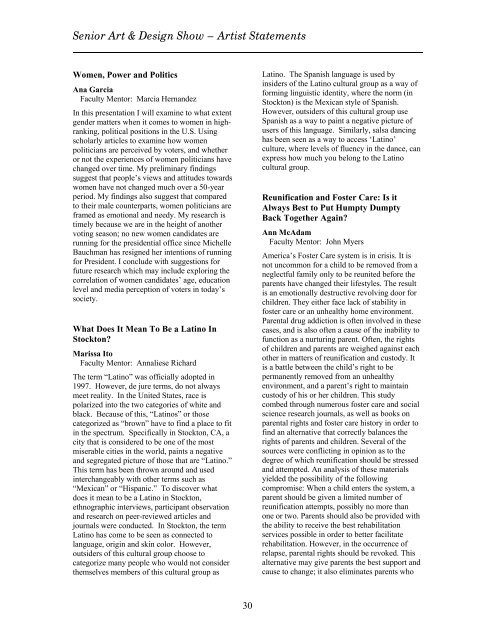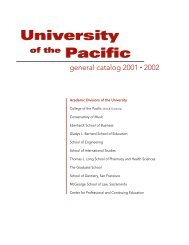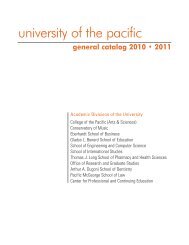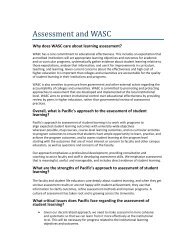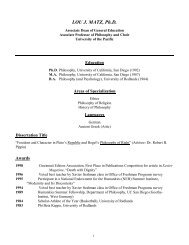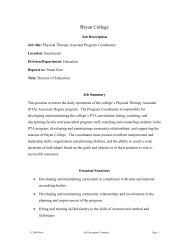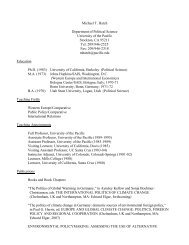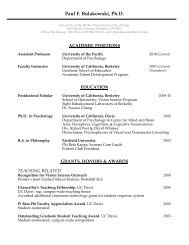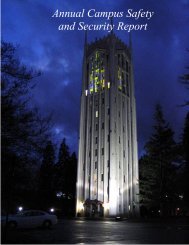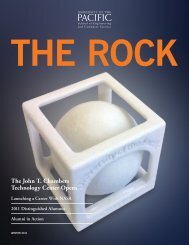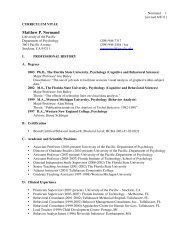purcc 2012 - University of the Pacific
purcc 2012 - University of the Pacific
purcc 2012 - University of the Pacific
You also want an ePaper? Increase the reach of your titles
YUMPU automatically turns print PDFs into web optimized ePapers that Google loves.
Senior Art & Design Show – Artist Statements<br />
Women, Power and Politics<br />
Ana Garcia<br />
Faculty Mentor: Marcia Hernandez<br />
In this presentation I will examine to what extent<br />
gender matters when it comes to women in highranking,<br />
political positions in <strong>the</strong> U.S. Using<br />
scholarly articles to examine how women<br />
politicians are perceived by voters, and whe<strong>the</strong>r<br />
or not <strong>the</strong> experiences <strong>of</strong> women politicians have<br />
changed over time. My preliminary findings<br />
suggest that people’s views and attitudes towards<br />
women have not changed much over a 50-year<br />
period. My findings also suggest that compared<br />
to <strong>the</strong>ir male counterparts, women politicians are<br />
framed as emotional and needy. My research is<br />
timely because we are in <strong>the</strong> height <strong>of</strong> ano<strong>the</strong>r<br />
voting season; no new women candidates are<br />
running for <strong>the</strong> presidential <strong>of</strong>fice since Michelle<br />
Bauchman has resigned her intentions <strong>of</strong> running<br />
for President. I conclude with suggestions for<br />
future research which may include exploring <strong>the</strong><br />
correlation <strong>of</strong> women candidates’ age, education<br />
level and media perception <strong>of</strong> voters in today’s<br />
society.<br />
What Does It Mean To Be a Latino In<br />
Stockton?<br />
Marissa Ito<br />
Faculty Mentor: Annaliese Richard<br />
The term “Latino” was <strong>of</strong>ficially adopted in<br />
1997. However, de jure terms, do not always<br />
meet reality. In <strong>the</strong> United States, race is<br />
polarized into <strong>the</strong> two categories <strong>of</strong> white and<br />
black. Because <strong>of</strong> this, “Latinos” or those<br />
categorized as “brown” have to find a place to fit<br />
in <strong>the</strong> spectrum. Specifically in Stockton, CA, a<br />
city that is considered to be one <strong>of</strong> <strong>the</strong> most<br />
miserable cities in <strong>the</strong> world, paints a negative<br />
and segregated picture <strong>of</strong> those that are “Latino.”<br />
This term has been thrown around and used<br />
interchangeably with o<strong>the</strong>r terms such as<br />
“Mexican” or “Hispanic.” To discover what<br />
does it mean to be a Latino in Stockton,<br />
ethnographic interviews, participant observation<br />
and research on peer-reviewed articles and<br />
journals were conducted. In Stockton, <strong>the</strong> term<br />
Latino has come to be seen as connected to<br />
language, origin and skin color. However,<br />
outsiders <strong>of</strong> this cultural group choose to<br />
categorize many people who would not consider<br />
<strong>the</strong>mselves members <strong>of</strong> this cultural group as<br />
Latino. The Spanish language is used by<br />
insiders <strong>of</strong> <strong>the</strong> Latino cultural group as a way <strong>of</strong><br />
forming linguistic identity, where <strong>the</strong> norm (in<br />
Stockton) is <strong>the</strong> Mexican style <strong>of</strong> Spanish.<br />
However, outsiders <strong>of</strong> this cultural group use<br />
Spanish as a way to paint a negative picture <strong>of</strong><br />
users <strong>of</strong> this language. Similarly, salsa dancing<br />
has been seen as a way to access ‘Latino’<br />
culture, where levels <strong>of</strong> fluency in <strong>the</strong> dance, can<br />
express how much you belong to <strong>the</strong> Latino<br />
cultural group.<br />
Reunification and Foster Care: Is it<br />
Always Best to Put Humpty Dumpty<br />
Back Toge<strong>the</strong>r Again?<br />
Ann McAdam<br />
Faculty Mentor: John Myers<br />
America’s Foster Care system is in crisis. It is<br />
not uncommon for a child to be removed from a<br />
neglectful family only to be reunited before <strong>the</strong><br />
parents have changed <strong>the</strong>ir lifestyles. The result<br />
is an emotionally destructive revolving door for<br />
children. They ei<strong>the</strong>r face lack <strong>of</strong> stability in<br />
foster care or an unhealthy home environment.<br />
Parental drug addiction is <strong>of</strong>ten involved in <strong>the</strong>se<br />
cases, and is also <strong>of</strong>ten a cause <strong>of</strong> <strong>the</strong> inability to<br />
function as a nurturing parent. Often, <strong>the</strong> rights<br />
<strong>of</strong> children and parents are weighed against each<br />
o<strong>the</strong>r in matters <strong>of</strong> reunification and custody. It<br />
is a battle between <strong>the</strong> child’s right to be<br />
permanently removed from an unhealthy<br />
environment, and a parent’s right to maintain<br />
custody <strong>of</strong> his or her children. This study<br />
combed through numerous foster care and social<br />
science research journals, as well as books on<br />
parental rights and foster care history in order to<br />
find an alternative that correctly balances <strong>the</strong><br />
rights <strong>of</strong> parents and children. Several <strong>of</strong> <strong>the</strong><br />
sources were conflicting in opinion as to <strong>the</strong><br />
degree <strong>of</strong> which reunification should be stressed<br />
and attempted. An analysis <strong>of</strong> <strong>the</strong>se materials<br />
yielded <strong>the</strong> possibility <strong>of</strong> <strong>the</strong> following<br />
compromise: When a child enters <strong>the</strong> system, a<br />
parent should be given a limited number <strong>of</strong><br />
reunification attempts, possibly no more than<br />
one or two. Parents should also be provided with<br />
<strong>the</strong> ability to receive <strong>the</strong> best rehabilitation<br />
services possible in order to better facilitate<br />
rehabilitation. However, in <strong>the</strong> occurrence <strong>of</strong><br />
relapse, parental rights should be revoked. This<br />
alternative may give parents <strong>the</strong> best support and<br />
cause to change; it also eliminates parents who<br />
30


